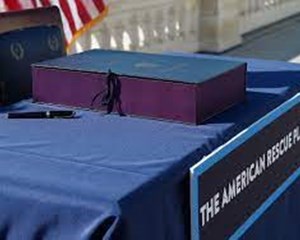The free market is dead. What comes next?
自由市場已逝,接下來呢?
By Chris Hughes
作者:克里斯·休斯
When the covid-19 pandemic struck, world markets came to a standstill. Governments around the world froze as much in-person economic activity as possible and opened their wallets to spend unprecedented sums of money to replace lost income. In the U.S., Republicans and Democrats agreed to invest record sums, nearly 20% of GDP. For the second time in 12 years, free markets had broken down, and government stepped up.
新冠大流行爆發后,全球市場陷入停滯。世界各國政府都在竭盡全力凍結其經濟活動,并打開國庫,花大把大把的錢來彌補收入損失。在美國,共和黨和民主黨都同意投入前所未有的超額巨款(接近GDP的20%)。這是自由市場12年來第二次崩潰,政府也加強了干預。
If the message wasn't clear before, it's now become impossible to miss: Government steps in when the going gets rough, ensuring that wealthy risk takers will be bailed out in the worst of times. Markets don't exist before the state does, and the state doesn't intervene in their natural work. But the state makes markets possible.
如果說之前的信息還不明朗,那么現在已經不可能錯過了:當形勢艱難時政府就該介入了,以此來確保大的風險承擔者能夠在最糟糕的時候獲得幫助,從而擺脫困境。市場不會先于政府而存在,政府也不應干預市場的自然運作,但國家能讓市場成為可能。

We are witnessing the most profound realignment in American political economy in nearly 40 years. President Ronald Reagan summed up the conventional wisdom that reigned from the mid-1970s onward in the U.S.: "Government is not the solution to our problem, government is the problem." Economists, policymakers and everyday Americans alike generally accepted that markets, unfettered and free, are the best way to create economic growth.
我們正在目睹美國政治經濟近40年來最深刻的重組。羅納德·里根總統總結了20世紀70年代中期以來統治美國的傳統觀念:“政府解決不了我們的問題,政府本身就是問題。”經濟學家、政策制定者和普通美國人都普遍認為,不受約束的自由的市場是創造經濟增長的最佳途徑。
That ideology began to crack after the 2008–2009 Great Recession, and in the wake of the COVID-19 pandemic it has collapsed. The rise of ethno-nationalism on the right and democratic socialism on the left testifies to the growing disillusionment with the conventional wisdom on how government and economics are supposed to work.
這種意識形態在2008-2009年的大衰退之后開始瓦解,在新冠大流行之后已經崩潰。右翼的種族民族主義和左翼的民主社會主義的興起,證明人們對政府和經濟應該如何運作的傳統觀念日益幻滅。
Cross-partisan supermajorities of Americans want some of the biggest companies in America broken up, significantly higher minimum wages and a wealth tax on billionaires, and believe significantly more public investment is required to create economic growth.
跨黨派的絕大多數美國人希望拆分美國一些最大的公司,大幅提高最低工資,對億萬富翁征收財富稅,并認為需要大幅增加公共投資來創造經濟增長。
We have had regulations, public investment and macroeconomic management to varying degrees throughout American history. What makes this moment different is people across parties, classes and educational backgrounds are using a new framework to think about how we create prosperity.
縱觀美國歷史,我們經歷過不同程度的監管、公共投資和宏觀經濟管理。而此時的不同之處在于,不同黨派、不同階層、不同教育背景的人們正在用一種新的框架來思考“我們該如何創造繁榮”。
譯文由可可原創,僅供學習交流使用,未經許可請勿轉載。











